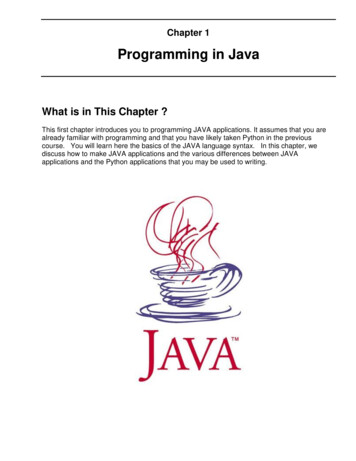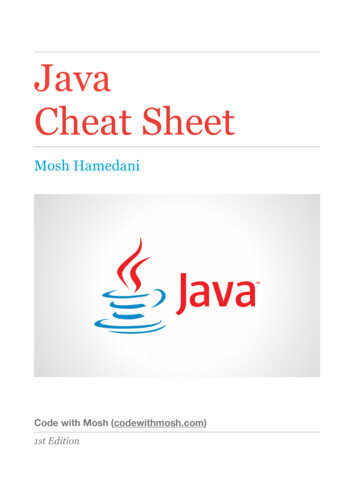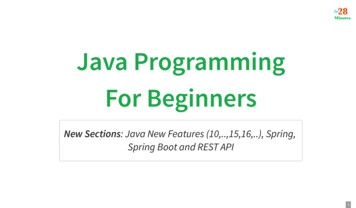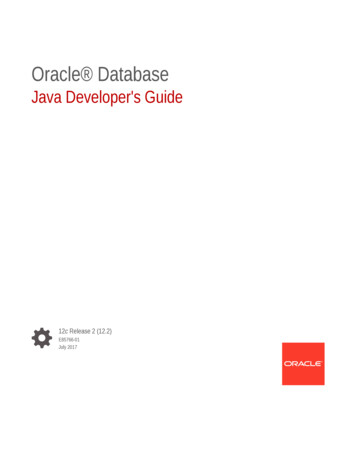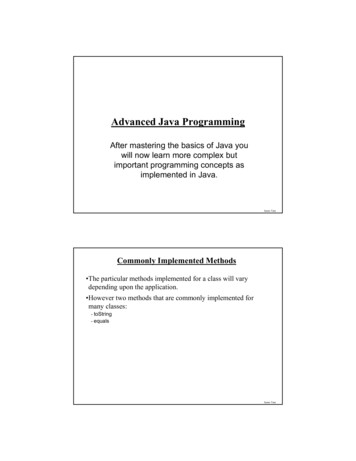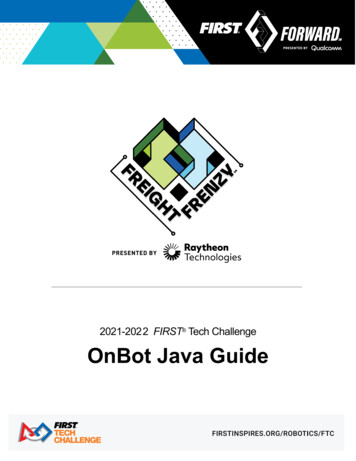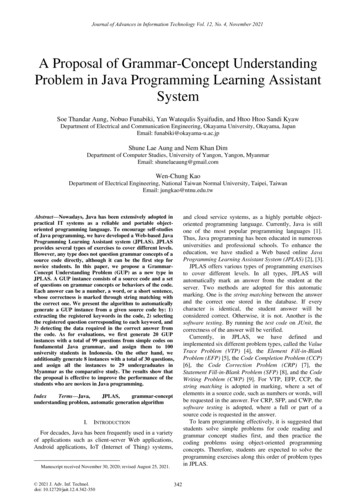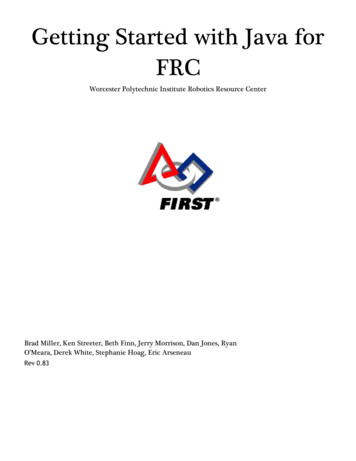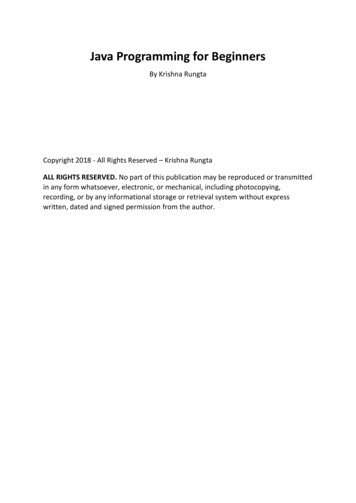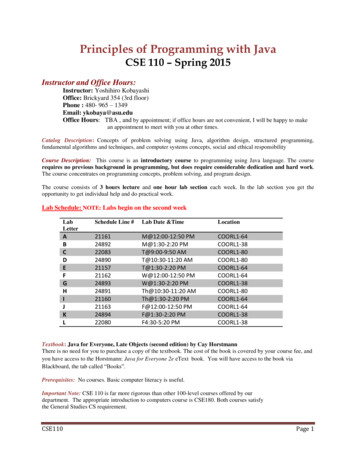
Transcription
Principles of Programming with JavaCSE 110 – Spring 2015Instructor and Office Hours:Instructor: Yoshihiro KobayashiOffice: Brickyard 354 (3rd floor)Phone : 480- 965 – 1349Email: ykobaya@asu.eduOffice Hours: TBA , and by appointment; if office hours are not convenient, I will be happy to makean appointment to meet with you at other times.Catalog Description: Concepts of problem solving using Java, algorithm design, structured programming,fundamental algorithms and techniques, and computer systems concepts, social and ethical responsibilityCourse Description: This course is an introductory course to programming using Java language. The courserequires no previous background in programming, but does require considerable dedication and hard work.The course concentrates on programming concepts, problem solving, and program design.The course consists of 3 hours lecture and one hour lab section each week. In the lab section you get theopportunity to get individual help and do practical work.Lab Schedule: NOTE: Labs begin on the second weekLabLetterSchedule Line #Lab Date 21162248932489121160211632489422080M@12:00-12:50 PMM@1:30-2:20 PMT@9:00-9:50 AMT@10:30-11:20 AMT@1:30-2:20 PMW@12:00-12:50 PMW@1:30-2:20 PMTh@10:30-11:20 AMTh@1:30-2:20 PMF@12:00-12:50 PMF@1:30-2:20 PMF4:30-5:20 8COORL1-38Textbook: Java for Everyone, Late Objects (second edition) by Cay HorstmannThere is no need for you to purchase a copy of the textbook. The cost of the book is covered by your course fee, andyou have access to the Horstmann: Java for Everyone 2e eText book. You will have access to the book viaBlackboard, the tab called “Books”.Prerequisites: No courses. Basic computer literacy is useful.Important Note: CSE 110 is far more rigorous than other 100-level courses offered by ourdepartment. The appropriate introduction to computers course is CSE180. Both courses satisfythe General Studies CS requirement.CSE110Page 1
Major Topics Covered in the Course: Introduction to problem solving, requirements & specifications, algorithmsJava Primitive data types (int, double, char,.Control structures: if-else statements, switch statements, loopsClasses, objects, methods, parameters , overloadingArrays, searching and sortingLearning Outcomes: Develop Java programs using primitive typesUse predefined classes in their programs such as Math, String and Random classesRead and understand Java programs that include multiple methods, control flow, and arraysDevelop Java programs with multiple classes and writing methods with control flowDevelop Java programs applying object oriented programming approachUnderstand the use of static methods and variablesUnderstand searching and basic sorting algorithmsTips for Success: One does not learn how to program computers by reading a book alone;Practice is essential. Students who are most successful in CSE110 read the upcoming sectionsin the text book ahead of time to first introduce terms and concepts, attend every class and participate actively(taking notes and asking questions), review the material in the text again to make sure it is clear, read and beginassignments shortly after they are posted so they may ask questions well ahead of the deadline, go to office hours oruse the discussion board when help is needed, study past homework, quizzes, handouts lecture notes and use them topractice writing code in preparation for exams.Course Web Site:Most documents (i.e. assignments, solutions, some notes, etc.,) associated with this course will be made available athttps://courses.eas.asu.edu/cse110b/, ASU's portal system. All students who are registered in CSE110 courseshould be able to access the course material through ASU's portal. If you experience any difficulty, please let meknow as soon as possible. It is your responsibility to print your assignments from this web site and startworking on the assignment as soon as it is posted. Try to get started early on your assignments so you can gethelp if you need it. You should check the announcement page often as the semester progresses.Getting Help:There are many help resources available for this course. You can get help from tutors during office hours each week.In addition, their schedule will be available later on the course web page. Tutors office hours and lab hours aresubject to change. For the latest information on office and lab hours, please check the class web page frequently. Ifyou bring questions regarding assignments, make sure you have the development of your solution thus far.Assignments and Assessment (subject to change): Your course grade in CSE110 will be based on the distributionbelow. Each item is elaborated upon in the following sections. There is absolutely no group work allowed in thiscourse unless explicitly stated by the instructor. QuizzesWeekly recitations (Labs)Assignments (drop lowest one)Exams (drop the lowest one)15%15%25%45%Quizzes: Quizzes may be announced during the class or they may be unannounced. There is no makeup for missed quizzes. The lowest quiz grade will be droppedLab assignments: lab assignments are programming projects assigned during lab time to enforce concepts learnedduring lecture. You have to complete them during lab time to get full credit forCSE110Page 2
the lab assignments.Assignments: Programming assignments will be given throughout the semester. As with all assessmentsin this class, all programming assignments are to be done individually because they are designed to help youpractice the concepts you need to learn in this class. Finding the answer somewhere does not equalpractice. Programming assignments should take you anywhere from thirty minutes to ten hours to complete,depending on your skill level and study habits. They may include a written portion, a programming portion, orboth. If you have trouble, please take advantages of office hours and other help resources, such as the discussionboard. Homework assignments can never be made up and can never be turned in late, but your lowest grade will bediscarded.Exams: There will be four exams (includes final exam) given during the semester. The exams will becomprehensive. Exams may consist of multiple choice, fill-in-the-blank, short answer, programming problems, orany combination thereof. The lowest exam grade will be discarded.The following scale will be used to determine your final grade:Grade Breakdown:Final GradePercentageA 98%A 90% and 98%B 88% and 90%B 80% and 88%C 78 and 80%C 70% and 78%D 60% and 70%E 60%All students must have a passing grade in both the exam component of the class and the assignments component ofthe class in order to pass the class. You can calculate your own standing by using the following formula:YP (YET - lowest exam score)/300 *45 (YAT - lowest assignment)/140* 25 (YQT - lowest quiz score) /(TNQ*10)*15 (YLT - lowest lab score)/(TNL*10)*15where:YP Your PercentYET Your Exam PointsYAT Your Assignments TotalTNQ Total number of quizzesYQT Your Quiz TotalYLT Your lab totalTNL Total number of labsGrading Appeals: Any discrepancy or disagreement in grading must be presented to the instructor within two daysof your receipt of your graded materials; otherwise no grade change will be made.Submission: Programming assignments will be submitted electronically to the assignment submission site. Pleasenote that this submission site is neither the digital drop box on Blackboard, nor is it by any means ofemail. Instructions for submission will be provided.Important Note: I reserve the right to change this grading system as the course progresses and variousCSE110Page 3
circumstances develop.Academic Integrity: The Student Academic Integrity Policy of Arizona State University requires each student toact with honesty and integrity and to respect the rights of others in carrying out all academic assignments(see: cial/academic integrity.htm) There are a number of actionsthat constitute a violation of the policy. These actions include, but are not limited to: practicing any form of academic deceit; referring to materials or sources or employing devices (e.g., audio recorders, crib sheets, calculators,solution manuals, or commercial research services) not specifically authorized by the instructor for useduring tests, quizzes, homework, and class activities; acting as a substitute for another person in any academic evaluation or using a substitute in any academicevaluation; possessing, buying, selling, or otherwise obtaining or using, without appropriate authorization, a copy of anymaterials intended to be used for academic evaluation in advance of its administration; depending on the aid of others to the extent that the work is not representative of the student’s abilities,knowing or having good reason to believe that this aid is not authorized by the instructor; providing inappropriate aid to another person, knowing or having good reason to believe the aid is notauthorized by the instructor; submitting the ideas or work of another person or persons without customary and proper acknowledgmentof sources (i.e., engaging in plagiarism); permitting one's own ideas or work to be submitted by another person without the instructor’sauthorization; or attempting to influence or change any academic evaluation or record for reasons having no relevance toclass achievement.University policy allows for cheating sanctions ranging from zero credit for an assignment to expulsion (withoutexpectation of readmission) from the University. Any student who is found to have violated the University'sAcademic Integrity Policy in this course, no matter how minor the violation, will at a minimum receive an Ein the course.Professional and Ethical Behavior: Engineers (and the students in this class) are expected to treat others fairly,with respect and courtesy, regardless of such factors as race, religion, sexual orientation, gender, disability, age, ornational origin. In this class, you are expected to contribute to the overall campus climate such that others feelwelcome, are respected, and are able to develop to their full potential. This will allow each person to contribute tothe success of the class as a whole. ASU and the College of Engineering are committed to maintaining a productive,enjoyable and diverse campus environment.Engineers are expected to effectively communicate ideas. Inappropriate language (written and oral) does noteffectively communicate your ideas to an audience. Inappropriate language includes not only profanity, but alsowords that are demeaning to a person or group (racially, sexually, ethnically, etc.).You are expected to participate in the various classroom activities, including: coming to each class on time and staying until dismissed; following instructions given by the instructor, including actively working on whatever assignment has beengiven; not consuming any food or drink while in the ASU classrooms, and not bringing any open containers offood or drink into the classrooms; and avoiding disruptive side conversations.You are expected to make appropriate use of ASU facilities and property, including: leaving a clean work space – tables, floors and chairs; all trash picked up and disposed of;treating walls, furniture and floors properly –putting feet on tables and chairs, etc., not writing upon ordisfiguring furniture; andCSE110Page 4
leaving computers as you would furniture – clean and ready to use, without any remaining software, links,screen savers or settings that will offend or impede the efforts of subsequent users.These are consistent with university-wide behavioral expectations described in the various codes of conduct andpolicies administered through ASU Office of Student Life - Student Judicial ndex.html adapted from Prof. Burrow’s documentUniversity Policies: All university and college policies concerning withdrawal deadlines, incomplete, audits, andother procedures are in effect for this course. All students are advised to be aware of and to carefully follow theseguidelines. Please do not come to me at the end of the course and want an "Incomplete" simply because you havefallen behind. Incomplete is not given.If you have need for special seating inform me at the beginning of the class. Furthermore I reserve the right to assignseating for any student at the beginning of the semester or during the semester.Java Resources: There are many online high quality resources available for Java. Check the tutorials lHow to Study: For general advice on how to study for any course, see Dr. William J. Rapaport's web page, "How toStudy".Note: You are responsible for the contents of this syllabus and the information on the homepage. Make sure youknow how to access the home page. Announcements in the class take precedence over printed material. It is veryimportant to check the homepage frequently during the semester.CSE110Page 5
Important Note:Please sign, date and return this page to the instructor to continue enrollment in the course. Yoursignature indicates your knowledge and acceptance of all policies indicated in the syllabusincluding but not limited to the following points:1. No late assignment will be accepted under any circumstances2. Any grading appeals must be submitted in writing to the instructor within two days ofyour receipt of graded materials3. Any instances of academic dishonesty will be punished at minimum with a failing gradedue to academic dishonesty (XE) for the course and at maximum with expulsion from theuniversity without expectation of readmission4. For all assignments (not labs) in CSE110, the following are Academic Integrity Policy(AIP) violations: if you(a) work with someone on the assignment or(b) use someone else's code or portions of their code or(c) provide code to someone who may use it, or(d) have another person write your codePrint nameSign nameDateEmail address@ASU.EDU(Not allowed to use other account such as @gmail.com and @hotmail.com)CSE110Page 6
Textbook: Java for Everyone, Late Objects (second edition) by Cay Horstmann There is no need for you to purchase a copy of the textbook. The cost of the book is covered by your course fee, and you have access to the Horstmann: Java for Everyone 2e eText book. You will have access to the book
